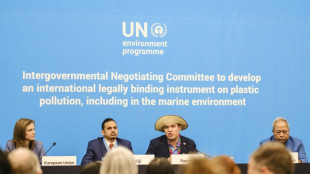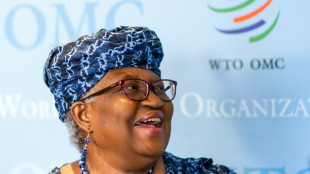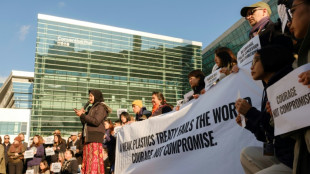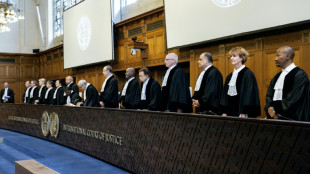
-
 Guardiola will not 'run' from Man City rebuild
Guardiola will not 'run' from Man City rebuild
-
Assisted dying campaigners, opponents rally at UK parliament

-
 Durable prop Healy set to carve name in Irish rugby history
Durable prop Healy set to carve name in Irish rugby history
-
Macron unveils Notre Dame after 'impossible' restoration

-
 Traumatised Spain marks one month since catastrophic floods
Traumatised Spain marks one month since catastrophic floods
-
Yen rallies, euro up on rising inflation data

-
 Attack-minded Spurs boss Postecoglou says: 'You'll miss me when I'm gone'
Attack-minded Spurs boss Postecoglou says: 'You'll miss me when I'm gone'
-
Syria jihadists, allies shell major city Aleppo in shock offensive

-
 Macron inspects 'sublime' Notre Dame after reconstruction
Macron inspects 'sublime' Notre Dame after reconstruction
-
Arsenal must be near-perfect to catch Liverpool, says Arteta

-
 Arrests, intimidation stoke fear in Pakistan's politics
Arrests, intimidation stoke fear in Pakistan's politics
-
Showdown looms on plastic treaty days before deadline

-
 Ngozi Okonjo-Iweala: the WTO's trailblazing motivator
Ngozi Okonjo-Iweala: the WTO's trailblazing motivator
-
WTO chief reappointed as Trump threat looms

-
 US landmine offer to Ukraine throws treaty into 'crisis': campaign group
US landmine offer to Ukraine throws treaty into 'crisis': campaign group
-
British MPs debate contentious assisted dying law

-
 Macron offers first glimpse of post-fire Notre Dame
Macron offers first glimpse of post-fire Notre Dame
-
Syria jihadists, allies shell Aleppo in shock offensive

-
 Japan government approves $92 bn extra budget
Japan government approves $92 bn extra budget
-
Toll in Syria jihadist-army fighting rises to 242: monitor

-
 UK transport secretary quits in setback for Starmer
UK transport secretary quits in setback for Starmer
-
Days before deadline, plastic treaty draft highlights disagreement

-
 Crypto boss eats banana art he bought for $6.2 million
Crypto boss eats banana art he bought for $6.2 million
-
Teen news boss criticises Australian social media ban

-
 Taiwan detects 41 Chinese military aircraft, ships ahead of Lai US stopover
Taiwan detects 41 Chinese military aircraft, ships ahead of Lai US stopover
-
Spain urged to 'build differently' after deadly floods

-
 WTO chief faces heavy task as Trump threat looms
WTO chief faces heavy task as Trump threat looms
-
Herbert takes control at Australian Open as Smith tanks

-
 Israel PM again warns Iran after top diplomat talks of revising nuclear doctrine
Israel PM again warns Iran after top diplomat talks of revising nuclear doctrine
-
Brilliant Brook's 132 puts England on top against sloppy New Zealand

-
 Brilliant Brook's 132 puts England on top against New Zealand
Brilliant Brook's 132 puts England on top against New Zealand
-
US landmine offer to Ukraine throws global treaty into 'crisis': campaign group

-
 Singapore hangs 4th person in three weeks
Singapore hangs 4th person in three weeks
-
Five things to know about NewJeans' shock split from agency

-
 Waste pickers battle for recognition at plastic treaty talks
Waste pickers battle for recognition at plastic treaty talks
-
Ireland votes in closely fought general election

-
 Top UN court to open unprecedented climate hearings
Top UN court to open unprecedented climate hearings
-
European countries that allow assisted dying

-
 British MPs to debate contentious assisted dying law
British MPs to debate contentious assisted dying law
-
Schmidt not expecting hero's welcome on Ireland return

-
 PSG stuck between domestic dominance and Champions League woes
PSG stuck between domestic dominance and Champions League woes
-
'Hot fight' as unbeaten Bayern visit Dortmund fortress

-
 Bordeaux-Begles' Samu 'not finished yet' with Wallabies
Bordeaux-Begles' Samu 'not finished yet' with Wallabies
-
Brook and Pope half-centuries haul England to 174-4 against NZ

-
 Yen rallies on rate hike bets as equity markets swing
Yen rallies on rate hike bets as equity markets swing
-
Ukraine superstar Mahuchikh brings 'good vibes' to her war-torn country

-
 PlayStation at 30: How Sony's grey box conquered gaming
PlayStation at 30: How Sony's grey box conquered gaming
-
Saudi Arabia hosts UN talks on drought, desertification

-
 PlayStation: Fun facts to know as Sony's console turns 30
PlayStation: Fun facts to know as Sony's console turns 30
-
Nepal's first transgender candidates run for local office


India's fireworks boom ahead of Hindu festival of lights
Wrapping heaps of cone-shaped sparklers in red paper and trimming lengths of silver fuse by the hundreds, workers at an Indian fireworks factory race to meet orders for Diwali, the Hindu festival of lights.
Authorities regularly impose bans on the smoky pyrotechnics to reduce the hazardous pollution they cause, but to many, firecrackers are an integral part of the holiday's celebrations.
Toxic chemical fumes hang heavy in the air at the factory in Sivakasi, a city in the southern state of Tamil Nadu, the heartland of India's fireworks production.
It is a risky job, with deadly explosions in factories taking place each year in India, but workers say they have little choice.
"There is no other job opportunity in the area", said 49-year-old Rajathi, pausing from the rapid work of sealing explosives in garish wrapping.
Rajathi, who uses only one name, said she did not want her children to follow in her footsteps at a job where she earns up to 800 rupees ($9.50) a day.
Cigarette lighters and mobile phones are often banned inside the factory, where conditions are bare-bones.
Workers, sitting on the floor, dip fuses with bare hands into pots of a silver-coloured mixture.
Others spread glue onto wrappers with their fingers, while others scatter the handmade paper shells of the fireworks out on mats to dry in the sun.
Sivaraj, aged 29, is new to the job.
"I know there have been accidents in the factories before, but I need to work to eat," he said.
Without formal education, he had few options.
"That is why I came to work in a fireworks factory", Sivaraj said, who also uses one name.
Diwali this year falls on November 1, and workers are busy packing boxes to meet the nationwide surge of demand.
- 'Curb high air pollution' -
The potent chemicals used to give the sparkling explosives their colour and noise add to the deadly toxic haze of vehicle emissions and factory fumes in cities that regularly rank among the worst in the world for air quality.
India's capital New Delhi on Monday ordered a "complete ban" on all firecrackers -- both their manufacture and sale -- in view of the "public interest to curb high air pollution".
But for many, Diwali would not be the same without the colourful and thunderous roar of crackers, and past bans have been widely flouted.
The spectacular and colourful festival celebrates the Hindu goddess Lakshmi and symbolises the victory of light over darkness.
The national holiday is marked by the exchange of gifts -- and of course, the setting off of fireworks.
In addition to the usual factory and vehicle emissions, smog in Indian cities this time of year is exacerbated by seasonal agricultural fires clearing harvest stubble for ploughing.
But pollution levels surge even more around Diwali, driven by the extra fumes from fireworks.
In New Delhi, levels of fine particulate matter -- cancer-causing microparticles known as PM2.5 pollutants that enter the bloodstream through the lungs -- often hit more than 30 times the World Health Organization's danger limits.
Prolonged exposure can trigger strokes, heart disease, lung cancer and other respiratory diseases, according to the WHO.
More than seven percent of all deaths in 10 of India's biggest cities are linked to air pollution, according to a study published last year in The Lancet Planetary Health journal.
I.Meyer--BTB
